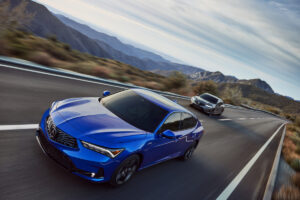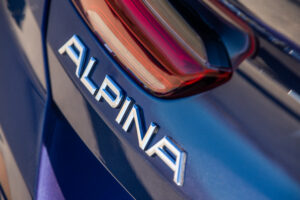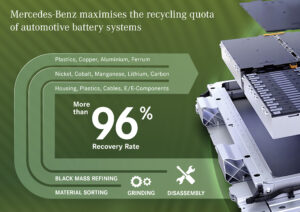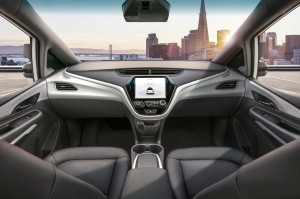
Listen to “AD #3279 – All-New Acura Integra Tech Specs; Car Thieves Go Crazy With Catalytic Converters; BYD Now #2 In China” on Spreaker.
Follow us on social media:
Runtime: 11:48
0:08 Car Thieves Go Crazy with Catalytic Converters
0:54 Rivian Stock Takes a Big Hit
1:52 BYD Now #2 In China
3:33 The Top 10 Car Companies in The World
4:38 All-New Acura Integra Tech Specs
6:04 BMW Buys Alpina
6:46 Oliver Schmidt Compares U.S. & German Prisons
8:40 Mercedes To Recycle EV Batteries
9:16 NHTSA Removes AV Mandate for Steering Wheels
9:52 Peter Rawlinson & The ABC’s Of EV Batteries
Visit our sponsors to thank them for their support of Autoline Daily: Bridgestone, Intrepid Control Systems and Schaeffler.
This is Autoline Daily, the show dedicated to enthusiasts of the global automotive industry.
CAR THIEVES GO CRAZY WITH CATALYTIC CONVERTERS
Car thieves are going crazy for catalytic converters. That’s because cats are full of platinum, palladium and rhodium, and prices for those rare metals are going through the roof. Last year, State Farm paid out $62.6 million for catalytic converter theft claims in the U.S. Are you sitting down? That was up 1,173% compared to 2019. And the problem will likely get worse. Thanks to Russia’s invasion of Ukraine the price of palladium hit an all-time high this week. Russia accounts for nearly 40% of palladium mined worldwide, and since most countries are avoiding Russia like the plague, prices could go even higher.
RIVIAN STOCK TAKES A BIG HIT
It isn’t easy being a startup, even if you have a war chest of $18 billion in cash. Rivian’s stock took a major hit yesterday on negative news about earnings and production. It lost $2.4 billion last year as it significantly increased spending, and doesn’t have much revenue coming in. But that’s to be expected with a startup. What really worries investors is that Rivian is cutting its production forecast in half for this year. It only plans on making 25,000 vehicles instead of the 50,000 it originally planned. The company blamed supply chain problems and investors took that as a cue to sell. Rivian’s stock is at $41 a share, which is down 47% from its IPO price, and down 76% from its peak last November when shares hit $172.
BYD NOW #2 IN CHINA
BYD, the privately owned Chinese car company, just moved into the Number Two slot in China. Last month it outsold SAIC-VW to become the second largest car company in China. The Number One slot goes to FAW-VW. BYD’s sales jumped 340% last year while SAIC-VW sales fell 19%. BYD is the only Chinese automaker with a full lineup of plug-in hybrids and BEVs. And today Chinese media is buzzing with a rumor that BYD and NIO could team on electric cars. The chairman of BYD and the founder of NIO were seen together at one of NIO’s showrooms. Here’s our Autoline Insight. We’re starting to see privately owned car companies in China really come into their own. Companies like BYD, NIO, Chery, Great Wall and Geely are more innovative and growing faster than Chinese car companies that are owned by city and provincial governments.
THE TOP 10 CAR COMPANIES IN THE WORLD
Can you name the top 10 car companies in the world? You probably can. But can you put them in the right order by sales? We weren’t sure that we could, so we had to look up the numbers. And some of the results are surprising. Number One is Toyota, which sold over 10 million vehicles last year. That includes Daihatsu and Hino. Next is the Volkswagen Group which sold over 8.8 million. Then comes the Renault-Nissan-Mitsubishi Alliance with 7.8 million. And look at this. The Hyundai Group, which includes Kia, is now the fourth largest automaker in the world with sales topping 6.6 million. Then comes General Motors at nearly 6.3 million. Number Six is Stellantis at 6.1. Seven is Honda at 4.1. But wow! Look, Ford is down to Number 8, with 3.9 million vehicles. BMW is 9th with 2.5, and Mercedes-Benz rounds out the top 10 with 2 million vehicles sold last year.
| 2021 TOP 10 GLOBAL OEMS | |
|---|---|
| Toyota | 10,495,548 |
| VW | 8,882,000 |
| R-N-M | 7,810,589 |
| Hyundai | 6,668,037 |
| GM | 6,291,000 |
| Stellantis | 6,142,000 |
| Honda | 4,136,018 |
| Ford | 3,942,000 |
| BMW | 2,521,525 |
| Mercedes | 2,054,962 |
| Source: Company reports | |
ALL-NEW ACURA INTEGRA TECH SPECS
Acura gave the all-new Integra its proper reveal, a vehicle it calls a “gateway” to the brand that will start around $30,000. Under its aluminum hood is a 1.5L turbocharged 4-cylinder engine that makes 200 horsepower. A CVT is standard, but there’s also an option for a 6-speed manual that features a limited slip differential. Acura says an ultra-rigid body, fully independent suspension and sport tuned chassis give the Integra good handling and a comfortable ride. There’s an optional Adaptive Damper System as well that makes ride and handling even more sporty. Some of those sporty themes are picked up on the interior, which is highlighted by a standard 10.2-inch digital instrument cluster and an infotainment screen that seems to rise out of the dash. The Integra goes on sale in the U.S. this spring and the first 500 customers to order one have the opportunity to claim a limited-edition NFT or Non-Fungible Token that was designed by a 3D artist. And for those that want to learn more about the brand, Acura claims it’s the first automaker to open a virtual showroom in the metaverse. Going to www.acuraverse.com visitors will be able to explore Acura’s lineup, browse its new wearable collection and play a racing game.
BMW BUYS ALPINA
There are a lot of startups coming into the auto industry, but we’re also seeing more consolidation and partnerships amongst automakers, like the merger of PSA and FCA to form Stellantis. And we’re also seeing consolidation amongst the smaller, bespoke vehicle makers and tuners. Pininfarina was purchased by Mahindra. Polestar is now under the Volvo/Geely wing. And BMW just bought ALPINA, a company that’s been making high-performance BMWs since the 60’s. The two companies already had a cooperation agreement that lasted until the end of 2025 and it sounds like after that ALPINA will be absorbed into BMW.
OLIVER SCHMIDT COMPARES US & GERMAN PRISONS
Wow, did we have a great Autoline After Hours yesterday. Oliver Schmidt, the Volkswagen engineer from Germany who was involved in VW’s coverup of cheating on diesel emissions was on the show. He spoke very openly of his involvement in dieselgate, as well as the time he spent in a US federal prison when he was sentenced to 7 years for his involvement. For the final two years, he was transferred to a prison in Germany, and he talked about the difference between German and US prisons.
“The thing is, in the US, you can have more activities. Our cell block was opened at 6 o’clock in the morning and it was closed at nine o’clock in the night. And I could go out, I could do sports five hours, ten hours a day if I wanted. If you had a job, of course you had to go to the job. You could walk to the library whenever you wanted, not for a half hour a week when your time spot was (which is all you get in a German prison). You could go there anytime you wanted to. You could go to the church, which was always open and you could have a chat with the local chaplain. So, for the prisoner, I don’t talk about rehabilitation and all that, but for the prisoner himself I would prefer the American prison, with the 2-man cell like I stayed in, to the German prison.”
You can watch that entire interview on our website or YouTube channel.
If you like the kind of information we provide, please like this video and subscribe to the channel, it can really help us out.
MERCEDES TO RECYCLE EV BATTERIES
As the auto industry transitions to battery electrics, there’s a lot of concern about what happens to the batteries at the end of their life. So Mercedes is kicking off a pilot project to recycle batteries and is building a new plant in Germany to test the process. It says it will be able to recycle 96% of the battery, which will help Mercedes become more independent of raw material supplies. The pilot plant, which opens next year, will have an annual capacity to recycle 2,500 metric tonnes of material, which will be used to produce 50,000 new batteries.
NHTSA REMOVES AV MANDATE FOR STEERING WHEELS
Good news for General Motors and other companies looking to deploy robotaxis in the U.S. The National Highway Traffic Safety Administration issued new rules for autonomous-only vehicles that eliminates regulations that mandated manual driving equipment, like steering wheels, pedals and turn signal stalks. AVs still have to meet the same safety standards as traditional cars, but they don’t need that other stuff. NHTSA usually takes forever to implement new safety standards so we commend the agency for moving so quickly with this ruling.
PETER RAWLINSON & THE ABC’S OF EV BATTERIES
If you’re looking to get a better basic understanding of EV batteries you might want to check out a video by Lucid Motors that’s hosted by its CEO Peter Rawlinson on its YouTube channel. He talks about what kWh are, why higher voltage systems are better, battery cooling and more. Rawlinson also revealed something proprietary to its battery construction. He says resistance is a killer for any battery. So, rather than linking all the battery cells with two fused bonding wires, Lucid only uses one, which means the thickness of each wire is different. Rawlinson says he doesn’t know of anyone else doing this and it plays a key role in reducing heat and resistance in the Lucid battery pack. It might not sound like this should make a big difference, but when you have 6,600 cells in a whole pack, it really starts to add up. And this came right from its learnings from Formula E. If you didn’t know, a Lucid brand has supplied the battery pack for the all-electric racing series since its launch. We’ll provide a link if you’d like to watch for yourself.
That wraps up today’s show, thanks for watching and have a great weekend.
Thanks to our partner for embedding Autoline Daily on its website: WardsAuto.com
Seamus and Sean McElroy cover the latest news in the automotive industry for Autoline Daily.










